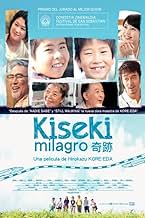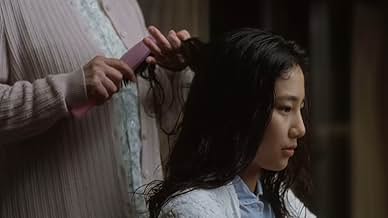IMDb-BEWERTUNG
7,3/10
8290
IHRE BEWERTUNG
Füge eine Handlung in deiner Sprache hinzuTwelve-year-old Koichi, who has been separated from his brother Ryunosuke due to his parents' divorce, hears a rumor that the new bullet trains will precipitate a wish-granting miracle when ... Alles lesenTwelve-year-old Koichi, who has been separated from his brother Ryunosuke due to his parents' divorce, hears a rumor that the new bullet trains will precipitate a wish-granting miracle when they pass each other at top speed.Twelve-year-old Koichi, who has been separated from his brother Ryunosuke due to his parents' divorce, hears a rumor that the new bullet trains will precipitate a wish-granting miracle when they pass each other at top speed.
- Auszeichnungen
- 5 Gewinne & 9 Nominierungen insgesamt
Kôki Maeda
- Koichi
- (as Koki Maeda)
Ôshirô Maeda
- Ryunosuke
- (as Oshiro Maeda)
Nene Ôtsuka
- Nozomi (Mother)
- (as Nene Ohtsuka)
Empfohlene Bewertungen
If, as many have pointed out, Koreeda is Ozu's cinematic heir, then I Wish is Koreeda's take on Ozu's Good Morning. Both films focus on adorable young kids and Japanese family life, and I have no qualms about saying between the two films, Koreeda easily outdoes Ozu. Not only is Koreeda's depiction of children subtler and more intuitive (no fart jokes here), but he coaxes wonderfully naturalistic performances from his child actors. Is there a director alive who does better work with kids than Koreeda? The movie really takes flight once the kids hit the road on their quest, and I loved the Ozu-ish part where they meet an elderly couple that takes in all the children for a night. Just a wonderful movie with tons of heart. Puts the human in humanistic filmmaking.
This is the story of two young Japanese brothers who live apart following the break-up of their parents' relationship. The older boy dreams of his family reuniting and prays for a miraculous intervention in the form of a volcanic eruption, hoping this might lead to his evacuation from his grandparents' region and a return home. Then, when he discovers that the passing of the speeding Bullet trains, approaching from opposite directions, creates a 'cosmic' moment during which wishes are granted, he sets out with a few friends to meet his brother at the meeting point on the railway line. There they make their wishes - with varying results.
The two brothers are forced to deal with the consequences of their parents' choices, ones they have had no part in making. Their belief, to varying degrees, in the power of 'faith' (believing that wishes can come true) then leads them to have to face the consequences of their own choices. Given their youthful immaturity, there is real poignancy in witnessing their confrontation with some harsh realities.
The movie features brilliant performances from the young actors and an excellent supporting cast of adults. There is also gorgeous and evocative cinematography, scenes of the Japanese countryside and its urban impositions, not least the Bullet line itself elevated on its concrete trackbed.
It takes some time, too long perhaps, for the story to gain momentum. But once the youngsters embark on their journey to meet the trains, the story moves at a brisker, more engaging pace. The climax (yes there is a climax, contrary to the view of another reviewer) brings moments of intense beauty and sharp sadness, regret for the loss of childish innocence of as well as optimism in the hope for a better future.
So this is a slow-burner, but persistence brings rewards. Recommended.
(Viewed at The Cornerhouse, Manchester, UK 21.02.13)
The two brothers are forced to deal with the consequences of their parents' choices, ones they have had no part in making. Their belief, to varying degrees, in the power of 'faith' (believing that wishes can come true) then leads them to have to face the consequences of their own choices. Given their youthful immaturity, there is real poignancy in witnessing their confrontation with some harsh realities.
The movie features brilliant performances from the young actors and an excellent supporting cast of adults. There is also gorgeous and evocative cinematography, scenes of the Japanese countryside and its urban impositions, not least the Bullet line itself elevated on its concrete trackbed.
It takes some time, too long perhaps, for the story to gain momentum. But once the youngsters embark on their journey to meet the trains, the story moves at a brisker, more engaging pace. The climax (yes there is a climax, contrary to the view of another reviewer) brings moments of intense beauty and sharp sadness, regret for the loss of childish innocence of as well as optimism in the hope for a better future.
So this is a slow-burner, but persistence brings rewards. Recommended.
(Viewed at The Cornerhouse, Manchester, UK 21.02.13)
I've been impressed with Koreeda's work in the past. "Maborosi" and "After Life" are two excellent, deeply philosophical and moving films. Maybe based on those I had unrealistically high expectations (further inflated by the DVD box boasting a dozen rave reviews & awards), but "I Wish" failed to deliver.
One hour into this 2-hour movie I had to shut it off. Since I didn't watch the whole thing I can't fairly rate it, but I wanted to share my (unpleasant) experience because I wish someone had warned me the same way. This was the first time in my life I've ever shut off a movie from sheer boredom. No, boredom isn't the word. It was more a feeling of total disconnection. The scenes, perhaps attempting to recreate the disconnected, ADD-type thought process of little kids, were so unrelated and random that I became irritated.
Like my title suggests, if you want to see a truly magical film about youth, innocence and the not-so-innocent, hunt down a film called "Kikujiro" (1999). More about that later. First let's talk about "I Wish".
Here is a breakdown of the first hour. Each scene lasts 2-5 minutes. At any time if you become bored, skip to the last paragraph of my review.
Scene 1) a boy grabs a washcloth and cleans his desk. Scene 2) The boy's mother is talking about meaningless things while the grandmother makes random gestures in the air, saying "I'm the wind. I'm a ghost. Etc..." Scene 3) The boys walk to school and complain about the hill. Scene 4) Kids are scolded by a teacher for not doing their homework properly. Scene 5) Kids are in the hall complaining about the teacher. Scene 6) Back to the mother and grandparents talking about vegetable gardens. Scene 7) Jump to some other kids at a swimming pool. Scene 8) The boy stares blankly at his homework assignment. Scene 9) A bunch of old men talk about baking a cake for the festival. Scene 10) The boys are back in school ogling the librarian's legs. Scene 11) The boy's father wakes up, strums a guitar and goes back to sleep. Scene 12) The kids gather and talk about acting.
While I hesitate to call the movie "bad" because I didn't watch it all the way through, I can definitely conclude that the first hour didn't provide enough substance to convince me to keep watching. And trust me, I like slow movies (2001, Werckmeister Harmonies, Hitchcock's Rope). Instead of watching "I Wish", I HIGHLY recommend a Japanese film called "Kikujiro" which this movie seemed to be imitating. However, even though it is slow paced, "Kikujiro" wastes no scenes. They all relate to each other, build upon each other and eventually lead you to a powerful message by the time the film ends. The music in "Kikujiro" (composed by the Japanese master Joe Hisaishi) is also leagues above the mediocre soundtrack of "I Wish", another turnoff. Maybe one day I'll go back & finish the last hour of this film and revise this review if I feel differently. But all the same, I'd rather spend my time watching something else.
One hour into this 2-hour movie I had to shut it off. Since I didn't watch the whole thing I can't fairly rate it, but I wanted to share my (unpleasant) experience because I wish someone had warned me the same way. This was the first time in my life I've ever shut off a movie from sheer boredom. No, boredom isn't the word. It was more a feeling of total disconnection. The scenes, perhaps attempting to recreate the disconnected, ADD-type thought process of little kids, were so unrelated and random that I became irritated.
Like my title suggests, if you want to see a truly magical film about youth, innocence and the not-so-innocent, hunt down a film called "Kikujiro" (1999). More about that later. First let's talk about "I Wish".
Here is a breakdown of the first hour. Each scene lasts 2-5 minutes. At any time if you become bored, skip to the last paragraph of my review.
Scene 1) a boy grabs a washcloth and cleans his desk. Scene 2) The boy's mother is talking about meaningless things while the grandmother makes random gestures in the air, saying "I'm the wind. I'm a ghost. Etc..." Scene 3) The boys walk to school and complain about the hill. Scene 4) Kids are scolded by a teacher for not doing their homework properly. Scene 5) Kids are in the hall complaining about the teacher. Scene 6) Back to the mother and grandparents talking about vegetable gardens. Scene 7) Jump to some other kids at a swimming pool. Scene 8) The boy stares blankly at his homework assignment. Scene 9) A bunch of old men talk about baking a cake for the festival. Scene 10) The boys are back in school ogling the librarian's legs. Scene 11) The boy's father wakes up, strums a guitar and goes back to sleep. Scene 12) The kids gather and talk about acting.
While I hesitate to call the movie "bad" because I didn't watch it all the way through, I can definitely conclude that the first hour didn't provide enough substance to convince me to keep watching. And trust me, I like slow movies (2001, Werckmeister Harmonies, Hitchcock's Rope). Instead of watching "I Wish", I HIGHLY recommend a Japanese film called "Kikujiro" which this movie seemed to be imitating. However, even though it is slow paced, "Kikujiro" wastes no scenes. They all relate to each other, build upon each other and eventually lead you to a powerful message by the time the film ends. The music in "Kikujiro" (composed by the Japanese master Joe Hisaishi) is also leagues above the mediocre soundtrack of "I Wish", another turnoff. Maybe one day I'll go back & finish the last hour of this film and revise this review if I feel differently. But all the same, I'd rather spend my time watching something else.
In Kagoshima, the boy Koichi (Koki Maeda) lives with his mother Nozomi (Nene Ohtsuka) in the house of his grandparents. Koichi misses his younger brother Ryunosuke (Ohshirô Maeda) and his father Kenji (Jô Odagiri), who live in Fokuoko, and he dreams on his family coming together again. One day, Koichi overhears that the energy released by two bullet trains passing by each other would grant wishes and he invites his two best friends, Tasuku (Ryôga Hayashi) and Makoto (Seinosuke Nagayoshi), to travel to the point of intersection of the two trains. Koichi also tells his plan to Ryunosuke that invites his three best friends to join him. Soon the seven children arrive to the meeting point in the journey of discoveries.
"Kiseki" is a simple and sensitive tale of loss of innocence of children that need to face reality instead of immature and naive dreams. The come of age of Koichi that accepts the divorce of his parents and of Megumi (Kyara Uchida) that decides to move to Tokyo to become an actress and Makoto that decides to bury his dog are clearly are depicted in the story. Ryunosuke is still a child and believes that his wish is the responsible for the chance his father and his friends will have in their career of musicians.
The direction of Hirokazu Koreeda and the performances are top-notch and the movie shows landscapes of the countryside of Japan that are unusual in Japanese features. My vote is eight.
Title (Brazil): "O Que Eu Mais Desejo" ("What I Desire the Most")
"Kiseki" is a simple and sensitive tale of loss of innocence of children that need to face reality instead of immature and naive dreams. The come of age of Koichi that accepts the divorce of his parents and of Megumi (Kyara Uchida) that decides to move to Tokyo to become an actress and Makoto that decides to bury his dog are clearly are depicted in the story. Ryunosuke is still a child and believes that his wish is the responsible for the chance his father and his friends will have in their career of musicians.
The direction of Hirokazu Koreeda and the performances are top-notch and the movie shows landscapes of the countryside of Japan that are unusual in Japanese features. My vote is eight.
Title (Brazil): "O Que Eu Mais Desejo" ("What I Desire the Most")
Kouichi (Kouki Maeda) and Ryunosuke (Oushiro Maeda) who's parents are separated and now lives apart in Fukuoka, and Kagoshima hears about a rumor that if you see the meeting of the first bullet trains from Fukuoka and Kagoshima, a miracle will happen. Wishing that the miracle will be the reunion of their parents, they set out to see the meeting of the two trains, while involving their friends, teachers, and adults around them.
Child prodigy stand up comic team Maeda-Maeda performs the role of Kouichi, and Ryunosuke. Director Hirokazu Koreeda originally had a different plot for the story, where a girl living in Fukuoka, goes to see the two trains crossing each other on the track, meets a boy from Hakata and love story ensues. But upon seeing Maeda-Maeda at the audition, he changed the story to that which involves the two brothers. The project was a promotional campaign for the opening of the Kagoshima route of Japan Railways bullet train line. They brought the project to director Koreeda, and he accepted.
Very common story that involves nothing but the life of few children, but is made extraordinary by the direction of Koreeda, and the performance of Maeda brothers. Observation of people in common life, and attention to detail is extraordinary, and can only come from the eyes of a genius. I can see why Koreeda is regarded so highly as a director. I'd say only few directors can take a theme like this, and create a truly intriguing movie like this one.
In reality it is virtually impossible to pinpoint where the two trains will meet on the track, so the story is purely fictional.
It may be difficult to see all the inner workings of this movie at a first glance, but it is worth the time to sit in and really enjoy the performance.
Child prodigy stand up comic team Maeda-Maeda performs the role of Kouichi, and Ryunosuke. Director Hirokazu Koreeda originally had a different plot for the story, where a girl living in Fukuoka, goes to see the two trains crossing each other on the track, meets a boy from Hakata and love story ensues. But upon seeing Maeda-Maeda at the audition, he changed the story to that which involves the two brothers. The project was a promotional campaign for the opening of the Kagoshima route of Japan Railways bullet train line. They brought the project to director Koreeda, and he accepted.
Very common story that involves nothing but the life of few children, but is made extraordinary by the direction of Koreeda, and the performance of Maeda brothers. Observation of people in common life, and attention to detail is extraordinary, and can only come from the eyes of a genius. I can see why Koreeda is regarded so highly as a director. I'd say only few directors can take a theme like this, and create a truly intriguing movie like this one.
In reality it is virtually impossible to pinpoint where the two trains will meet on the track, so the story is purely fictional.
It may be difficult to see all the inner workings of this movie at a first glance, but it is worth the time to sit in and really enjoy the performance.
Wusstest du schon
- WissenswertesShinkansen wanted to make a movie to promote their bullettrains. They approached Koreeda, an avid trainlover. He came up with this movie.
- VerbindungenFeatured in A Story of Children and Film (2013)
- SoundtracksKAGOSHIMA OHARA BUSHI
Written by Quruli
Performed by Quruli
Top-Auswahl
Melde dich zum Bewerten an und greife auf die Watchlist für personalisierte Empfehlungen zu.
- How long is I Wish?Powered by Alexa
Details
- Erscheinungsdatum
- Herkunftsland
- Offizielle Standorte
- Sprache
- Auch bekannt als
- Phép Màu Giữa Đời Thường
- Drehorte
- Produktionsfirmen
- Weitere beteiligte Unternehmen bei IMDbPro anzeigen
Box Office
- Bruttoertrag in den USA und Kanada
- 145.808 $
- Eröffnungswochenende in den USA und in Kanada
- 10.919 $
- 13. Mai 2012
- Weltweiter Bruttoertrag
- 2.371.548 $
- Laufzeit2 Stunden 8 Minuten
- Farbe
- Sound-Mix
- Seitenverhältnis
- 1.85 : 1
Zu dieser Seite beitragen
Bearbeitung vorschlagen oder fehlenden Inhalt hinzufügen
































